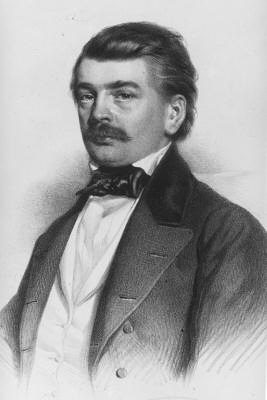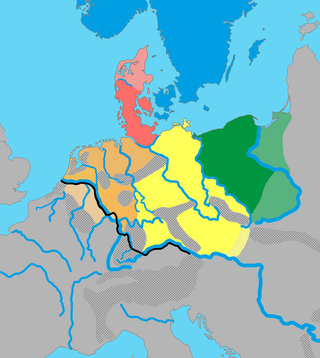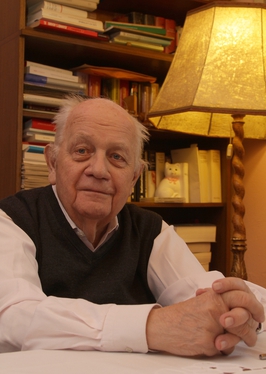Georg Holzer (born 1957 in Vienna) is an Austrian Slavist and Indo-Europeanist.
After graduating in Slavic Studies and Indo-European Studies at the University of Vienna, he earned his doctorate in 1982. Immediately thereafter he started a three-year appointment as a lecturer for German language at the Faculty of Humanities and Social Sciences in Zagreb. Since 1997 he has been an associate professor at the Institute for Slavic Studies at the University of Vienna. He also occasionally teaches at the universities of Zagreb and Zadar.
Holzer is the author of five books and over 50 scientific articles. In 1995, Holzer devised a new theory about the state of the Proto-Slavic language around 600 AD. After initial skepticism, the far-reaching statements on a relatively narrow empirical basis have been recognized in comparative Slavistics. Holzer is the author of the article Urslawisch ('Proto-Slavic') published in the Lexikon der Sprachen des europäischen Ostens ('Encyclopaedia of the languages of the European East'). This is part of the plan of the Austrian Ministry of Science since 2000. The Encyclopedia of the European East ('Enzyklopädie des europäischen Ostens, EEO) has been published, in Klagenfurt.
Holzer directs the ongoing research project started in January 2001: The language of the medieval Slavs in Austria (Die Sprache des mittelalterlichen Slawentums in Österreich), conducted by the Austrian Academy of Sciences, with research assistant Angela Bergermayer. As a result of this project a dictionary of medieval Slavic words and glosses will be published, based on toponomastic material covering the territory of Austria.

The Pomeranian language is in the Pomeranian group of Lechitic languages within the West Slavic languages.

Franz Miklosich was a Slovene philologist.

The Polabian language, also known as Drevanian–Polabian language, Drevanian language, and Lüneburg Wendish language, is a West Slavic language that was spoken by the Polabian Slavs in present-day northeastern Germany around the Elbe. It was spoken approximately until the rise to power of Prussia in the mid-18th century – when it was superseded by Low German – in the areas of Pomoré, central (Mittelmark) part of Branibor (Brandenburg) and eastern Saxony-Anhalt, as well as in eastern parts of Wendland and Dravänia (Schleswig-Holstein), Ostholstein and Lauenburg). Polabian was also relatively long spoken in and around the cities of Bukovéc (Lübeck), Starigard (Oldenburg) and Trava (Hamburg). The very poorly attested Slavic dialects of Rügen seemed to have had more in common with Polabian than with Pomeranian varieties. In the south, it bordered on the Sorbian language area in Lusatia.

The Curonian language, or Old Curonian, was a Baltic language spoken by the Curonians, a Baltic tribe who inhabited Courland.

August Schleicher was a German linguist. His great work was A Compendium of the Comparative Grammar of the Indo-European Languages in which he attempted to reconstruct the Proto-Indo-European language. To show how Indo-European might have looked, he created a short tale, Schleicher's fable, to exemplify the reconstructed vocabulary and aspects of Indo-European society inferred from it.

The East Germanic languages, also called the Oder-Vistula Germanic languages, are a group of extinct Germanic languages that were spoken by East Germanic peoples. East Germanic is one of the primary branches of Germanic languages, along with North Germanic and West Germanic.

The Balto-Slavic languages form a branch of the Indo-European family of languages, traditionally comprising the Baltic and Slavic languages. Baltic and Slavic languages share several linguistic traits not found in any other Indo-European branch, which points to a period of common development and origin.

Manfred Mayrhofer was an Austrian Indo-Europeanist who specialized in Indo-Iranian languages. Mayrhofer served as professor emeritus at the University of Vienna. He is noted for his etymological dictionary of Sanskrit.
Graeco-Armenian is the hypothetical common ancestor of Greek and Armenian branches that postdates Proto-Indo-European language. Its status is somewhat similar to that of the Italo-Celtic grouping: each is widely considered plausible without being accepted as established communis opinio. The hypothetical Proto-Graeco-Armenian stage would need to date to the 3rd millennium BC and would be only barely different from either late Proto-Indo-European or Graeco-Armeno-Aryan.

Proto-Albanian is the ancestral reconstructed language of Albanian, before the Gheg–Tosk dialectal split. Albanian evolved from an ancient Paleo-Balkan language, traditionally thought to be Illyrian, or otherwise a totally unattested Balkan Indo-European language that was closely related to Illyrian and Messapic, which is sometimes also referred to as Albanoid.
Georg Renatus Solta was an Austrian Indo-Europeanist who specialized in Balkan linguistics.
Harald Haarmann is a German linguist and cultural scientist who lives and works in Finland. Haarmann studied general linguistics, various philological disciplines and prehistory at the universities of Hamburg, Bonn, Coimbra and Bangor. He obtained his PhD in Bonn (1970) and his habilitation in Trier (1979). He taught and conducted research at a number of German and Japanese universities. He is Vice-President of the Institute of Archaeomythology and director of its European branch.

Karl-Markus Gauß is an Austrian contemporary writer, essayist and editor. He lives in Salzburg.
Ranko Matasović is a Croatian linguist, Indo-Europeanist, and Celticist.
The Slavic liquid metathesis refers to the phenomenon of metathesis of liquid consonants in the Common Slavic period in the South Slavic and West Slavic area. The closely related corresponding phenomenon of pleophony occurred in parallel in the East Slavic languages.
The Indo-Semitic hypothesis maintains that a genetic relationship exists between Indo-European and Semitic and that the Indo-European and the Semitic language families both descend from a common root ancestral language. The theory has never been widely accepted by contemporary linguists in modern times, but historically it had a number of supporting advocates and arguments, particularly in the 19th and 20th centuries.
Karl Penka was an Austrian philologist and anthropologist. Known for his now-outdated theories locating the Proto-Indo-European homeland in Northern Europe, Penka has been described as "a transitional figure between Aryanism and Nordicism".
Peter Sandrini is an Italian-born translation theorist and terminologist. He is currently researcher at the University of Innsbruck at the department of translation studies.
Baltistics, also referred to as Baltic studies, is a multidisciplinary study of the language and culture of the Baltic nations. Baltistics by its subject splits into Lithuanistics, Latvistics, Prussistics, etc. Special attention is paid to the language studies, especially to the reconstruction of the Proto-Baltic language, which some linguists have argued is the same as the Proto-Balto-Slavic language. Currently there are about 30 centres of Baltistics, most of them based in Europe, the University of Vilnius considered to be the most active centre.
Heinz-Dieter Pohl is an Austrian linguist and onomatologist.









